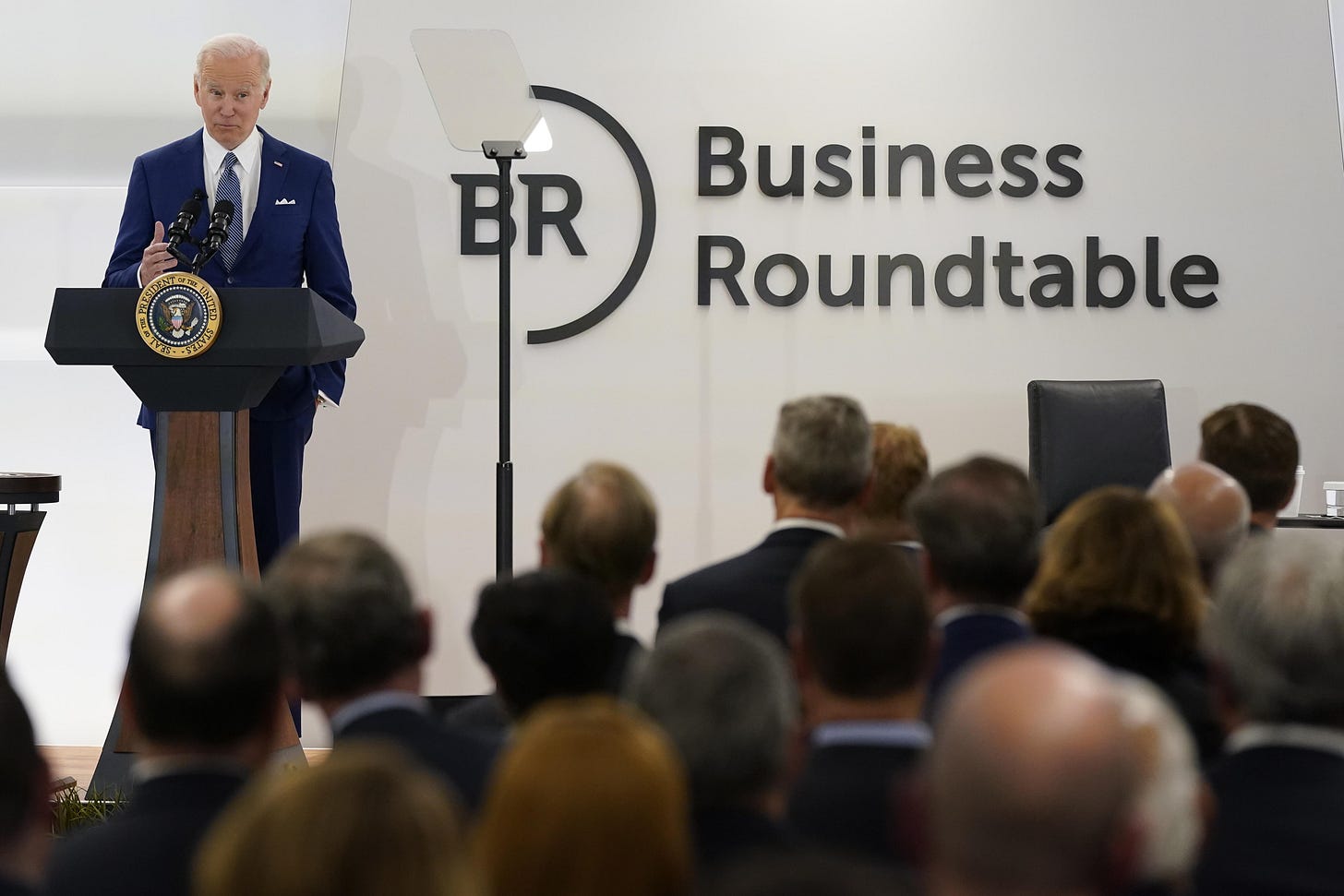From ROI to ESG: Why Major Corporations Pivoted from Shareholder Capitalism to Stakeholder Capitalism
How the Business Roundtable's 2019 Statement on the Purpose of a Corporation "Redefined" Corporate Governance
For most of corporate America’s history, what happened in the boardroom largely stayed in the boardroom. Although most Americans owned stocks in major corporations, they did not have to worry about corporate policies or practices. It was a given that major corporations would operate in the best interest of their shareholders. In recent years, however, corporations have abandoned shareholders for stakeholders as the focus of corporate governance.
Shareholder capitalism, which has been the dominant philosophy of corporate governance for over 200 years, asserts that a company's primary responsibility is to maximize shareholder value. This system is defended on the basis that shareholders are the backbone of public corporations and metrics such as stock price provide a tangible way to quantify success. Stakeholder capitalism, on the other hand, asserts that a company’s primary responsibility is to maximize stakeholder value. Stakeholders include employees, customers, suppliers, the community where the business is located, and the broader environment. Many advocates of stakeholder capitalism are worried that shareholder capitalism neglects the negative social and environmental impacts of corporate actions. It is the rise of stakeholder capitalism that has driven the embrace of Environmental, Social, and Governance (ESG) factors in corporate governance.
Environmental factors have impacted business practices by mainstreaming climate alliances, tying executive pay to ESG considerations, and directing large swaths of resources toward environmental reporting. Most major corporations now devote an entire section of their website to sustainability, often linking to annual sustainability reports that are over 100 pages long. Furthermore, over half of the Fortune 250 are involved in one or more climate alliances committed to leveraging shareholder assets for net-zero emissions and other climate goals.
Social factors have likewise impacted business practices through the embrace of Diversity, Equity, and Inclusion (DEI). It is increasingly commonplace among major corporations to discriminate against people based on their race and/or sex through supplier diversity quotas, hiring quotas, and/or leadership composition quotas. Since the Supreme Court overturned Affirmative Action in 2022, America First Legal has filed over 30 lawsuits against major corporations for discrimination based on race and/or sex.
Although environmental and social factors have significantly impacted business practices, governance factors are by far the most influential part of the ESG movement. In fact, you can think of governance as the engine of the ESG movement. Once a corporation decides to be governed by the philosophy of stakeholder capitalism, the door swings wide open to orient its policies and practices around environmentalism, divisive social agendas, and any other demands of outside organizations. It is this exporting of corporate governance driving radical corporate activism in America.
In 2022, social media exposed just how bad corporate activism had gotten to the average person through the examples of Bud Light, Disney, and Target. Bud Light decided to sponsor a transgender influencer, Disney continued to push LGBTQ themes in its films, and Target decided to sell “tuck-friendly” swimsuits for children. Although corporate activism has steadily increased over the past decade, there was a noticeable increase beginning in 2020. Many factors contributed to this rise in activism, including the COVID-19 pandemic and the BLM movement, however, this does not fully explain why major corporations pledged billions of dollars to racial justice causes or were complicit in the censorship of mainstream perspectives online through the pandemic.
(Bud Light, Bruce Glikas/WireImage)
So, what changed? Why did corporations turn from serving their shareholders to serving the interests of particular activist groups? Why did corporations stop caring so much about Return on Investment (ROI) and start obsessing over Environmental, Social, and Governance (ESG) factors?
A driving force behind mainstream acceptance of stakeholder capitalism among major corporations was the Business Roundtable’s 2019 Statement on the Purpose of a Corporation. This statement attempted to redefine the purpose of a corporation from serving its shareholders to serving all stakeholders.
The Business Roundtable is an association of 200+ CEOs from the largest corporations in America. The companies that make up the Business Roundtable support one in four American jobs and about 25% of U.S. GDP. The Business Roundtable develops policy recommendations and advocates for the broader business community.
(AP Photo/Patrick Semansky)
Since 1978, the Business Roundtable has periodically released policy recommendations on corporate governance. From the 1997 Principles of Corporate Governance document until the 2019 Statement on the Purpose of a Corporation, the Business Roundtable affirmed shareholder primacy as the foundational principle of corporate governance. The Business Roundtable has always acknowledged that stakeholder considerations must be taken into account for the sake of long-term stockholders, but claimed these interests were “derivative of the duty to stockholders”. In other words, creating value for employees, customers, suppliers, and other stakeholders would inevitably create value for the company and thus create value for the shareholders.
In 2019, 181 Business Roundtable CEOs, chaired by Jamie Dimon (CEO of JPMorgan Chase) at the time, attempted to redefine the purpose of a corporation. According to this statement, the long-term interests of stakeholders are “inseparable” from those of a corporation. The Business Roundtable attempted to “modernize” corporate governance principles in the face of changing economic circumstances. However, the shift to stakeholder capitalism has only ceded corporations to political activists and hurt Americans of every stripe.
Whereas shareholder capitalism has tangible metrics of success such as stock price, stakeholder capitalism is inherently subjective. Who decides who counts as a stakeholder? Are all stakeholders equal in value? How do you evaluate the success of a corporation benefiting these stakeholders? As a letter from 14 state treasurers earlier this month pointed out, a stakeholder capitalism model results in management picking winners and losers among various stakeholder groups.
The bottom line is this: executives are elected for their expertise in creating value for a company and not in identifying or solving society’s problems. The corporate focus on stakeholders has harmed both shareholders and stakeholders, as evidenced by Bud Light, Disney, and Target. BudLight is no longer the best-selling beer in America, Target dropped $10 billion in value following its Pride 2023 collection, and Disney’s stock value has dropped about 40% over the past two years.
Ultimately, people want corporations to stop being political and instead focus on creating quality goods and services. According to a Gallup poll released earlier this month, for two consecutive years, “adults have become less likely to want to hear from businesses on current events,” with less than one-third of adults wanting businesses to speak out on a given issue. This comports with a study released this month by the 1792 Exchange in conjunction with WestGroup Research and the Manuel H. Johnson Center for Political Economy at Troy University. The study found that “62% of respondents want chief executives to get back to running their businesses and stop taking stands on politically sensitive topics.”
The desire for corporate depoliticization has become increasingly clear. In recent months, customer and shareholder frustrations toward major corporations have been channeled by independent journalist Robby Starbuck into a series of successful campaigns aimed at reforming corporate behavior. Initially, this was only among corporations with a disproportionately conservative constituency such as Tractor Supply and John Deere. However, in the past week, companies like Lowe’s and Ford complied with Starbuck’s wishes, apologizing for their activism and pledging to change their behavior moving forward.
Considering the subjective nature of stakeholder capitalism and the harm it has done to shareholders, customers, employees, and suppliers, it is time for the signatories of this letter to renounce their support for stakeholder primacy. Additionally, the Business Roundtable should release a new Principles of Corporate Governance document that apologizes for the 2019 letter and once again affirms shareholder primacy as the foundation of good corporate governance.
One of my goals professionally as a corporate researcher and personally through my Substack is to shine a light on malpractice in corporate governance. If this article was of interest to you, I suggest you check out my other newsletters where I have addressed governance issues in the past decade which led major corporations to be complicit in the quiet revolution of transgender healthcare (through the Human Rights Campaign’s Corporate Equality Index) and the censoring of mainstream perspectives online (through the Global Alliance for Responsible Media’s Brand Safety Framework).
I would appreciate you sharing my Substack with one or two friends who would be interested in the topics I am writing about.
My focus areas are:
Recovering the proper Biblical paradigm in the Protestant church
Reforming the Southern Baptist Convention
Integrating spiritual formation with other areas of knowledge
Shining a light on malpractice in corporate governance
Engaging spiritual seekers and skeptics
You can learn more about me and my Substack here.





